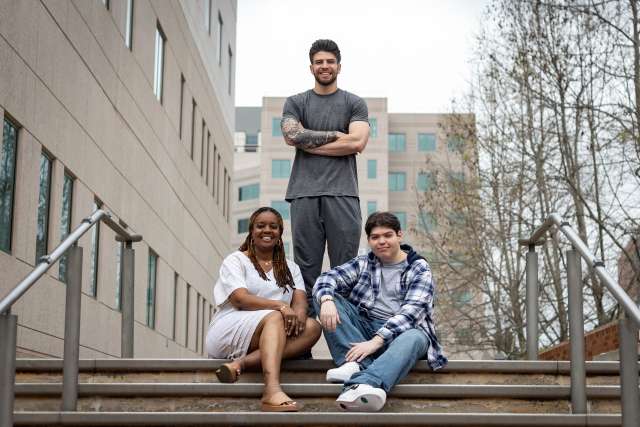Researchers at UCLA's Jonsson Comprehensive Cancer Center have discovered a way to "amp up" the power of killer T cells known as CD8 cells in the immune system, making them more functional for longer periods of time and boosting their ability to multiply and expand within the body to fight melanoma.
The study, done in mouse models of metastatic melanoma that had spread to the brain, has important clinical implications, as the method could improve the cancer-killing power of experimental immunotherapies being tested now for various cancers, including deadly glioblastoma and metastatic melanoma, both of which are very difficult to treat successfully.
The study's senior author, Robert Prins, a UCLA associate professor of neurosurgery and a Jonsson Cancer Center scientist, said the killer T cells were also better able to recognize and traffic to the cancer, which is crucial, as the immune system often fails to identify malignant cells as invading enemies.
The study is published in the May issue of the peer-reviewed Journal of Immunology.
The process Prins and his team used sought to mimic the way the T cells in the immune system recognize and fight viruses in the body, stimulating what is called the innate immune system. The innate immune system is made up of cells that immediately defend the body from infection, but it frequently is not stimulated in the presence of cancer, Prins said. However, the innate immune cells can be tricked into thinking a virus is present by treating them with compounds that activate Toll-like receptors (TLRs).
Prins' group had previously demonstrated that TLR agonists, such as imiquimod, could synergize with dendritic cell vaccines, both in mouse models and patient clinical trials. Interleukin 12 (IL-12) is one of the predominant cytokines released when TLRs are activated. In this study, the researchers wanted to see how IL-12 would affect the CD8 T cells.
Graduate student Dominique Lisiero, the study's first author, said CD8 T cells come in a large variety of "flavors" and can be stimulated in different ways. However, what signals and which stimuli worked best to prime the cells to fight cancer was unclear. Lisiero added IL-12 to the CD8 T cells in culture, before the cells were transferred into mice with established brain tumors.
"We wanted to see if we could make these cells become better at either recognizing the tumor or killing tumor cells," she said. "We didn't know what to expect, but what we found was that when we programmed these cells in the presence of IL-12, the tumors decreased in size and the mice with brain metastases survived longer. In fact, Prins said that the mice treated with killer T cells primed in the presence of IL-12 lived about two-and-a-half times longer than those not receiving the IL-12.
To better understand the mechanisms by which priming killer T cells in the presence of IL-12 really enhanced their function, the team focused on how these T cells responded to a different cytokine, Interleukin 2 (IL-2). IL-2, which is instrumental in the body's natural response to infection and recognition of foreign invaders, is often included in adoptive transfer immunotherapies to help the T cells survive, but it has to be given in high doses that frequently cause significant toxicity to patients. Prins and Lisiero wanted to know if adding IL-12 would enhance the sensitivity of IL-2 signaling inside the T cells.
"T cells that were primed in the presence of IL-12 had a higher expression of the IL-2 receptor, meaning the T cells had an enhanced ability to respond to the IL-2. This, we believe, allowed the killer T cells to expand and survive after being transferred into mice with brain tumors," Lisiero said. "Because the IL-12 stimulates the IL-2 receptor, we can give much lower doses of IL-2 and still get the same anti-tumor function from the killer T cells. In patients, this may translate to reduced toxicity. Clinical trials, however, would be required to prove that this priming with IL-12 would have similar effects."
Lisiero also tested the new process on human T cells, culturing them in either IL-2 or IL-12, and studying their function in the lab. The function of the cells programmed in IL-12 was dramatically increased, Prins said, validating the work in the mouse models. Their findings are already influencing how T cells are grown in the lab, he said.
The findings also are translational to the clinic, since metastatic melanoma patients in clinical trials often are removed from the protocol when the cancer appears in their brain. Many oncologists and scientists still believe that T cells can't access the brain because of its immune privilege. This study, however, has proven in a pre-clinical model that these tumors in the brain can in fact be effectively targeted.
"The in vitro priming of mouse tumor–specific CD8 T cells in the presence of IL-12 induced a diverse and rapid anti-tumor effector activity while still promoting the generation of memory cells," the study states. "Importantly, the IL-12-primed effector T cells dramatically reduced the growth of well-established tumors and significantly increased survival to highly immune resistant, established intracranial tumors."
The study was funded by the National Institutes of Health, the Philip R. and Kenneth A. Jonsson foundations, and STOP Cancer.
UCLA's Jonsson Comprehensive Cancer Center has more than 240 researchers and clinicians engaged in disease research, prevention, detection, control, treatment and education. One of the nation's largest comprehensive cancer centers, the Jonsson Center is dedicated to promoting research and translating basic science into leading-edge clinical studies. In July 2010, the center was named among the top 10 cancer centers nationwide by U.S. News & World Report, a ranking it has held for 10 of the last 11 years.



